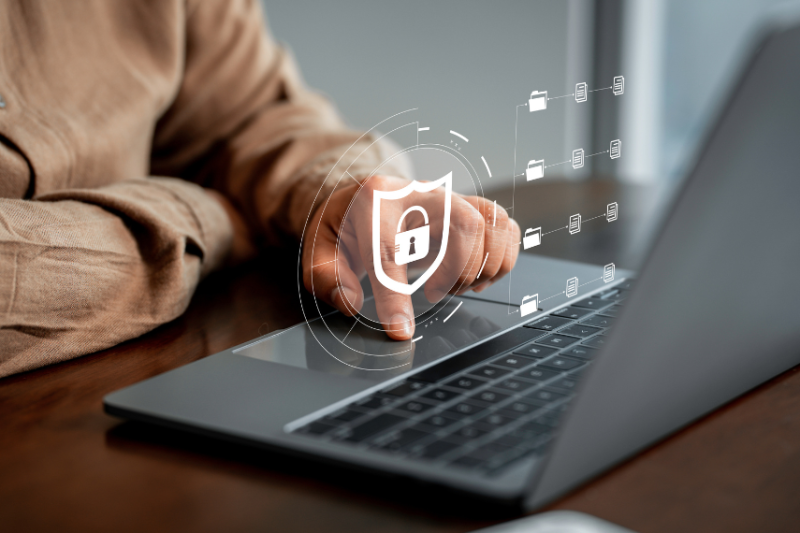
October is Cyber Security Awareness Month!
We know, it’s not quite as fun as planning your Halloween costume or cosying up with a spooky film.
But unfortunately, the risk of cyber-attacks only goes up as we rely more on the internet. Cybersecurity Awareness Month is there to remind you about how to protect yourself from cybercrime.
Follow our handy tips to stay safe online and avoid falling victim to fraud.
What is Cybersecurity Awareness Month?
Cybersecurity Awareness Month started off as an American campaign in 2004 – but it’s now known and practised around the world.
The goal is to raise awareness about cybersecurity risks, so people know how to recognise and avoid them when using their devices, like phones and laptops.
What are cyber security threats?
This is when your privacy and safety are put at risk while you’re using a computer, phone or other device.
These cyber threats can come in lots of different forms, including:
- Phishing attacks: misleading emails or messages that trick you into revealing personal information.
- Malware: harmful software that’s designed to damage or disable your computer.
- Ransomware: a type of malware that locks you out of your system until you pay a ransom.
- Identity theft: using someone’s personal information to get money, information and more.
Knowing about these threats is the first step in protecting yourself against them.
How do I recognise a cyber-threat?
There are a few red flags to look out for online that may mean you’ve been targeted:
- Friends getting messages from you that you didn’t send
- Payments on your cards that you didn’t make
- Getting random emails from senders you don’t know
- Your device working more slowly than usual or freezing a lot
- A new app appearing on your device that you don’t remember installing
Essential tips for staying safe online
Follow our handy tips for improving your online security.
Update your software regularly
Always keep your operating system, software and apps up to date. Regular updates can stop hackers from potentially getting hold of your personal information.
Use strong, unique passwords
Create complex passwords using a mix of letters, numbers and symbols. Avoid using the same password for lots of different accounts.
Consider using a trusted password manager to keep track of them securely.
Enable two-factor authentication (2FA)
Adding an extra layer of security, like a code sent to your phone, can make it harder for cybercriminals to get into your accounts.
Be wary of suspicious emails and links
Avoid clicking on links or downloading attachments from unknown or unexpected senders.
Always check that they can be trusted first by:
- calling the company to see if they really got in touch with you
- seeing if their email address matches the previous emails sent by the company
Secure your Wi-Fi network
Use strong passwords for your home Wi-Fi network and change the router’s original password (the one on the back of the router) to a new, complex password.
Encrypting your network can also protect it from being accessed by cyber criminals.
Back up your data
Regularly back up important data to an external drive or cloud storage.
This means you can recover your information in case you’re the victim of a cyber-attack or your hardware fails.
Use antivirus and anti-malware software
Reliable security software can spot and remove threats before they do any harm to your device. Make sure it’s set to update automatically.
Monitor your accounts
Regularly check your bank statements, credit reports and online accounts for any suspicious activity.
The sooner you spot any unusual transactions, the more of a chance you have to stop any further damage!
How to protect your privacy
Staying private online is harder than ever, especially if you’ve got loads of different accounts. Here are some more steps you can take to protect your personal information.
Adjust your privacy settings
Change your privacy settings on social media and other online accounts to control who can see your information.
For example, you can make your Instagram account private.
Limit sharing personal information
Be careful when sharing personal details like your address or phone number publicly online.
Delete old accounts
You may have a few online accounts that you don’t use anymore, but that doesn’t mean they can’t be hacked.
Have a think about any old social media, banking or email accounts you don’t use anymore and delete them if you can.
Use a VPN
A virtual private network (VPN) can encrypt your internet connection, making it harder for hackers to see and use your data – especially on public Wi-Fi networks.
Services like NordVPN and ExpressVPN are popular options for this.
Admiral’s Personal Cyber and Identity Theft Helpline
If you have Platinum Home Insurance or Family Legal Protection as an add on with us, you have access to a 24/7 Personal cyber and identity theft helpline.
This offers you support and advice if you’ve fallen victim to cybercrime, including if you’ve had your identity stolen or been extorted.
- identity theft
- fraudulent fund transfer
- cyber extortion
- financial loss
- breach of personal information
- cyber bullying
If you've experienced cybercrime, you can call our support service for help. One of our agents will work with you to see what’s happened, contain the damage, and discuss your next steps.
They can help with:
- documenting evidence or filling out reports
- liaising with your bank or authorities
- securing accounts and helping with password changes
- working out if data back-ups are available
They'll also give you some advice on how to protect yourself online in the future.
Our helpline is always open, except for December 25th and January 1st.
To see if you have access to it, check your cover in MyAccount.
Stay safe year-round
Black Friday’s coming up not long after Cybersecurity Awareness Month. Check out our Black Friday and Cyber Monday guide to keep yourself safe while online shopping.
We’ve also got a handy online security guide that you can use throughout the year to keep yourself protected.


